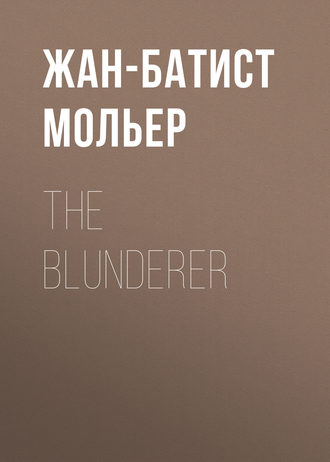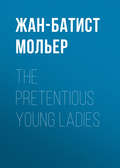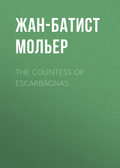
Мольер (Жан-Батист Поклен)
The Blunderer
SCENE XI. – LELIO, MASCARILLE
LEL. What the deuce are you doing there? You promised to perform wonders, but I am sure your dilatory ways are unparalleled. Had not my good genius inspired me, my happiness had been already wholly overthrown. There was an end to my good fortune, my joy. I should have been a prey to eternal grief; in short, had I not gone to this place in the very nick of time, Anselmo would have got possession of the captive, and I should have been deprived of her. He was carrying her home, but I parried the thrust, warded off the blow, and so worked upon Trufaldin's fears as to make him keep the girl.
MASC. This is the third time! When we come to ten we will score. It was by my contrivance, incorrigible scatterbrains, that Anselmo undertook this desirable purchase; she should have been placed into my own hands, but your cursed officiousness knocks everything on the head again. Do you think I shall still labour to serve your love? I would sooner a hundred times become a fat old woman, a dolt, a cabbage, a lantern, a wehrwolf, and that Satan should twist your neck!
LEL. (Alone.) I must take him to some tavern and let him vent his passion on the bottles and glasses.
ACT II
SCENE I. – LELIO, MASCARILLE
MASC. I have at length yielded to your desires. In spite of all my protestations I could hold out no longer; I am going to venture upon new dangers, to promote your interest, which I intended to abandon. So tender-hearted am I! If dame nature had made a girl of Mascarille, I leave you to guess what would have happened. However, after this assurance, do not deal a back stroke to the project I am about to undertake; do not make a blunder and frustrate my expectations. Then, as to Anselmo, we shall anew present your excuses to him, in order to get what we desire. But should your imprudence burst forth again hereafter, then you may bid farewell to all the trouble I take for the object of your passion.
LEL. No, I shall be careful, I tell you; never fear; you shall see…
MASC. Well, mind that you keep your word. I have planned a bold stratagem for your sake. Your father is very backward in satisfying all your wishes by his death. I have just killed him (in words, I mean); I have spread a report that the good man, being suddenly smitten by a fit of apoplexy, has departed this life. But first, so that I might the better pretend he was dead, I so managed that he went to his barn. I had a person ready to come and tell him that the workmen employed on his house accidentally discovered a treasure, in digging the foundations. He set out in an instant, and as all his people, except us two, have gone with him into the country, I shall kill him to-day in everybody's imagination and produce some image which I shall bury under his name. I have already told you what I wish you to do; play your part well; and as to the character I have to keep up, if you perceive that I miss one word of it, tell me plainly I am nothing but a fool.
SCENE II. – LELIO, alone
It is true, he has found out a strange way to accomplish my wishes fully; but when we are very much in love with a fair lady, what would we not do to be made happy? If love is said to be an excuse for a crime, it may well serve for a slight piece of imposture, which love's ardour to-day compels me to comply with, in expectation of the happy consequences that may result from it. Bless me! How expeditious they are. I see them already talking together about it; let us prepare to act our part.
SCENE III. – MASCARILLE, ANSELMO
MASC. The news may well surprise you.
ANS. To die in such a manner!
MASC. He was certainly much to blame. I can never forgive him for such a freak.
ANS. Not even to take time to be ill.
MASC. No, never was a man in such a hurry to die.
ANS. And how does Lelio behave?
MASC. He raves, and has lost all command over his temper; he has beaten himself till he is black and blue in several places, and wishes to follow his father into the grave. In short, to make an end of this, the excess of his grief has made me with the utmost speed wrap the corpse in a shroud, for fear the sight, which fed his melancholy, should tempt him to commit some rash act.
ANS. No matter, you ought to have waited until evening. Besides, I should have liked to see Pandolphus once more. He who puts a shroud on a man too hastily very often commits murder; for a man is frequently thought dead when he only seems to be so.
MASC. I warrant him as dead as dead can be. But now, to return to what we were talking about, Lelio has, resolved (and it will do him good) to give his father a fine funeral, and to comfort the deceased a little for his hard fate, by the pleasure of seeing that we pay him such honours after his death. My master inherits a goodly estate, but as he is only a novice in business, and does not see his way clearly in his affairs, since the greater part of his property lies in another part of the country, or what he has here consists in paper, he would beg of you, after having entreated you to excuse the too great violence which he has shewn of late, to lend him for this last duty at least…
ANS. You have told me so already, and I will go and see him.
MASC. (Alone). Hitherto, at least, everything goes on swimmingly; let us endeavour to make the rest answer as well; and lest we should be wrecked in the very harbour, let us steer the ship carefully and keep a sharp look out.
SCENE IV. – ANSELMO, LELIO, MASCARILLE
ANS. (Coming out of Pandolphus' house). Let us leave the house. I cannot, without great sorrow, see him wrapped up in this strange manner. Alas! in so short a time! He was alive this morning.
MASC. We go sometimes over a good deal of ground in a short time.
LEL. (Weeping). Oh!
ANS. Dear Lelio, he was but a man after all; even Rome can grant no dispensation from death.
LEL. Oh!
ANS. Death smites men without giving warning, and always has bad designs against them.
LEL. Oh!
ANS. That merciless foe would not loosen one grip of his murderous teeth, however we may entreat him. Everybody must feel them.
LEL. Oh!
MASC. Your preaching will all be in vain; this sorrow is too deep-rooted to be plucked up.
ANS. If, notwithstanding all these arguments, you will not cast aside your grief, at least, my dear Lelio, endeavour to moderate it.
LEL. Oh!
MASC. He will not moderate it; I know his temper.
ANS. However, according to your servant's message, I have brought you the money you want, so that you might celebrate your father's funeral obsequies!
LEL. Oh! oh!
MASC. How his grief increases at these words! It will kill him to think of his misfortune.
ANS. I know you will find by the good man's books that I owe him a much larger sum, but even if I should not owe anything, you could freely command my purse. Here it is; I am entirely at your service, and will show it.
LEL. (Going away). Oh!
MASC. How full of grief is my master!
ANS. Mascarille, I think it right he should give me some kind of receipt under his hand.
MASC. Oh!
ANS. Nothing in this world is certain.
MASC. Oh! oh!
ANS. Get him to sign me the receipt I require.
MASC. Alas! How can he comply with your desire in the condition he now is? Give him but time to get rid of his sorrow; and, when his troubles abate a little, I shall take care immediately to get you your security. Your servant, sir, my heart is over full of grief, and I shall go to take my fill of weeping with him. Hi! Hi!
ANS. (Alone). This world is full of crosses; we meet with them every day in different shapes, and never here below…
SCENE V. – PANDOLPHUS, ANSELMO
ANS. Oh Heavens! how I tremble! It is Pandolphus who has returned to the earth! God grant nothing disturbed his repose! How wan his face is grown since his death! Do not come any nearer. I beseech you; I very much detest to jostle a ghost.
PAND. What can be the reason of this whimsical terror?
ANS. Keep your distance, and tell me what business brings you here. If you have taken all this trouble to bid me farewell, you do me too much honour; I could really have done very well without your compliment. If your soul is restless, and stands in need of prayers. I promise you you shall have them, but do not frighten me. Upon the word of a terrified man, I will immediately set prayers agoing for you, to your very heart's content.
"Oh, dead worship, please to go!
Heaven, if now you disappear,
Will grant you joy down there below,
And health as well, for many a year."
[Footnote: This seems to be an imitation of a spell, charm, or incantation to lay the supposed ghost, which Anselmo says kneeling and hardly able to speak for terror.]
PAND. (Laughing). In spite of my indignation, I cannot help laughing.
ANS. It is strange, but you are very merry for a dead man.
PAND. Is this a joke, pray tell me, or is it downright madness to treat a living man as if he were dead?
ANS. Alas! you must be dead; I myself just now saw you.
PAND. What? Could I die without knowing it?
ANS. As soon as Mascarille told me the news, I was ready to die of grief.
PAND. But, really, are you asleep or awake? Don't you know me?
ANS. You are clothed in an aerial body which imitates your own, but which may take another shape at any moment. I am mightily afraid to see you swell up to the size of a giant, and your countenance become frightfully distorted. For the love of God, do not assume any hideous form; you have scared me sufficiently for the nonce.
PAND. At any other time, Anselmo, I should have considered the simplicity which accompanies your credulity an excellent joke, and I should have carried on the pleasant conceit a little longer; but this story of my death, and the news of the supposed treasure, which I was told upon the road had not been found at all, raises in my mind a strong suspicion that Mascarille is a rogue, and an arrant rogue, who is proof against fear or remorse, and who invents extraordinary stratagems to compass his ends.
ANS. What! Am I tricked and made a fool of? Really, this would be a compliment to my good sense! Let me touch him and be satisfied. This is, indeed, the very man. What an ass I am! Pray, do not spread this story about, for they will write a farce about it, and shame me for ever. But, Pandolphus, help me to get the money back which I lent them to bury you.
PAND. Money, do you say? Oh! that is where the shoe pinches; that is the secret of the whole affair! So much the worse for you. For my part, I shall not trouble myself about it, but will go and lay an information against this Mascarille, and if he can be caught he shall be hanged, whatever the cost may be.
ANS. (Alone). And I, like a ninny, believe a scoundrel, and must in one day lose both my senses and my money. Upon my word, it well becomes me to have these gray hairs and to commit an act of folly so readily, without examining into the truth of the first story I hear…! But I see…
SCENE VI. – LELIO, ANSELMO
LEL. Now, with this master-key, I can easily pay Trufaldin a visit.
ANS. As far as I can see, your grief has subsided.
LEL. What do you say? No; it can never leave a heart which shall ever cherish it dearly.
ANS. I came back to tell you frankly of a mistake I made in the money I gave you just now; amongst these louis-d'or, though they look very good, I carelessly put some which I think are bad. I have brought some money with me to change them. The intolerable audacity of our coiners is grown to such a height in this state, that no one can receive any money now without danger of his being imposed upon. It would be doing good service to hang them all!
LEL. I am very much obliged to you for being willing to take them back, but I saw none among them that were bad, as I thought.
ANS. Let me see the money; let me see it; I shall know them again. Is this all?
LEL. Yes.
ANS. So much the better. Are you back again? my dear money! get into my pocket. As for you, my gallant sharper, you have no longer got a penny of it. You kill people who are in good health, do ye? And what would you have done, then, with me, a poor infirm father-in-law? Upon my word, I was going to get a nice addition to my family, a most discreet son-in-law. Go, go, and hang yourself for shame and vexation.
LEL. (Alone). I really must admit I have been bit this time. What a surprise this is! How can he have discovered our stratagem so soon?
SCENE VII. – LELIO, MASCARILLE
MASC. What, you were out? I have been hunting for you everywhere. Well, have we succeeded at last? I will give the greatest rogue six trials to do the like. Come, give me the money that I may go and buy the slave; your rival will be very much astonished at this.
LEL. Ah! my dear boy, our luck has changed. Can you imagine how ill fortune has served me?
MASC. What? What can it be?
LEL. Anselmo having found out the trick, just now got back every sou he lent us, pretending some of the gold-pieces were bad, and that he was going to change them.
MASC. You do but joke, I suppose?
LEL. It is but too true.
MASC. In good earnest?
LEL. In good earnest; I am very much grieved about it. It will put you into a furious passion.
MASC. Me, sir! A fool might, but not I! Anger hurts, and I am going to take care of myself, come what will. After all, whether Celia be captive or free, whether Leander purchases her or whether she remains where she is, I do not care one stiver about it.
LEL. Ah! do not show such indifference, but be a little more indulgent to my slight imprudence. Had this last misfortune not happened, you would have confessed that I did wonders, and that in this pretended decease I deceived everybody, and counterfeited grief so admirably that the most sharp-sighted would have been taken in.
MASC. Truly you have great reason to boast.
LEL. Oh! I am to blame, and I am willing to acknowledge it; but if ever you cared for my happiness, repair this mishap, and help me.
MASC. I kiss your hands, I cannot spare the time.
LEL. Mascarille, my dear boy!
MASC. No.
LEL. Do me this favour.
MASC. No, I will not.
LEL. If you are inflexible, I shall kill myself.
MASC. Do so – you may.
LEL. Can I not soften your hard heart?
MASC. No.
LEL. Do you see my sword ready drawn?
MASC. Yes.
LEL. I am going to stab myself.
MASC. Do just what you please.
LEL. Would you not regret to be the cause of my death?
MASC. No.
LEL. Farewell, Mascarille.
MASC. Good bye, Master Lelio.
LEL. What…?
MASC. Kill yourself quick. You are a long while about it.
LEL. Upon my word, you would like me to play the fool and kill myself, so that you might get hold of my clothes.
MASC. I knew all this was nothing but a sham; whatever people may swear they will do, they are not so hasty now-a-days in killing themselves.
SCENE VIII. – TRUFALDIN, LEANDER, LELIO, MASCARILLE
(Trufaldin taking Leander aside and whispering to him).
LEL. What do I see? my rival and Trufaldin together! He is going to buy Celia. Oh! I tremble for fear.
MASC. There is no doubt that he will do all he can; and if he has money, he can do all he will. For my part I am delighted. This is a just reward for your blunders, your impatience.
LEL. What must I do? Advise me.
MASC. I don't know.
LEL. Stay, I will go and pick a quarrel with him.
MASC. What good will that do?
LEL. What would you have me do to ward off this blow?
MASC. Well, I pardon you; I will yet cast an eye of pity on you. Leave me to watch them; I believe I shall discover what he intends to do by fairer means. (Exit Lelio).
TRUF. (To Leander). When you send by and by, it shall be done.
MASC. (Aside and going out). I must trap him and become his confidant, in order to baffle his designs the more easily.
LEAND. (Alone). Thanks to Heaven, my happiness is complete. I have found the way to secure it, and fear nothing more. Whatever my rival may henceforth attempt, it is no longer in his power to do me any harm.







